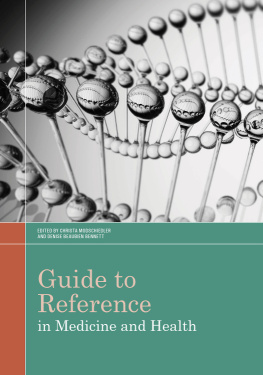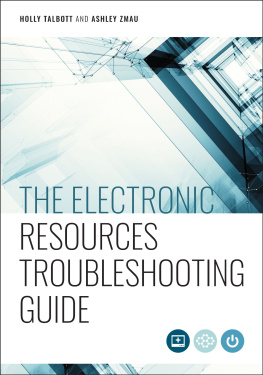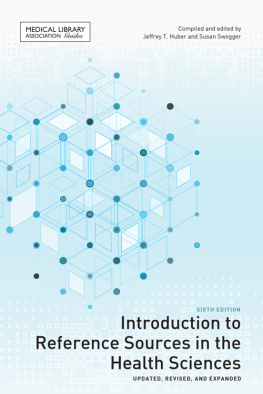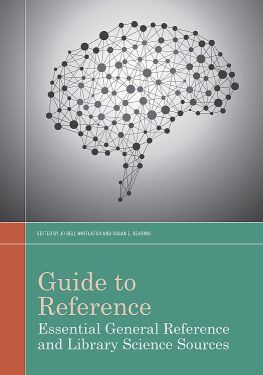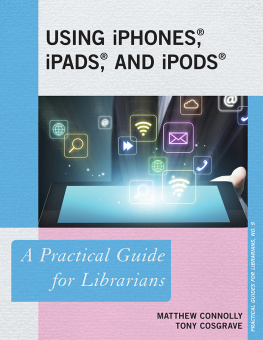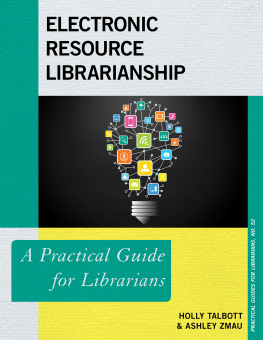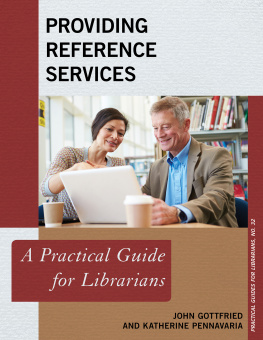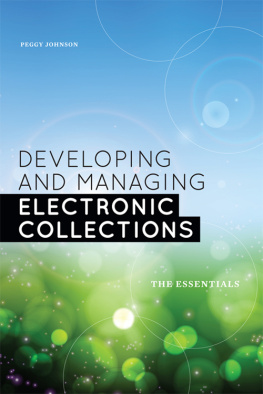The ABCs of ERM
Demystifying Electronic Resource Management for Public and Academic Librarians
Jessica Zellers, Tina M. Adams, and Katherine Hill

Copyright 2018 by Jessica Zellers, Tina M. Adams, and Katherine Hill
All rights reserved. No part of this publication may be reproduced, stored in a retrieval system, or transmitted, in any form or by any means, electronic, mechanical, photocopying, recording, or otherwise, except for the inclusion of brief quotations in a review, without prior permission in writing from the publisher.
Library of Congress Cataloging in Publication Control Number: 2017044500
ISBN: 978-1-4408-5580-1 (paperback)
978-1-4408-5581-8 (ebook)
22 21 20 19 18 1 2 3 4 5
This book is also available as an eBook.
Libraries Unlimited
An Imprint of ABC-CLIO, LLC
ABC-CLIO, LLC
130 Cremona Drive, P.O. Box 1911
Santa Barbara, California 93116-1911
www.abc-clio.com
This book is printed on acid-free paper 
Manufactured in the United States of America
Contents
CHAPTER ONE
So What Are Electronic Resources Anyway?
It used to be so simple.
If you wanted to borrow a book, you went to the library. That was the point of libraries. They had books you could borrow for free. There were other things, toonewspapers, microfilm readers, collections of magazines packaged in unattractive cardboard coversbut for most people, libraries were all about the books.
Then the internet happened.
The impact of the digital revolution on library collections cannot be overstated. Card catalogs gave way to online catalogs, vastly improving the accessibility and searchability of libraries holdings. Journals moved online and electronic databases sprang into existence, allowing ordinary people to become researchers without the need for librarian intervention. And when the online behemoth retailer Amazon released its first Kindle e-reader in 2007, electronic books went from irrelevancy to mainstream contenders, nearly overnight.
People still associate libraries with books. It doesnt matter how many instructional classes you offer, how many papier-mch crafts projects you host, how many databases you subscribe to. When people think of libraries, they think of row after row of physical books. And theyre not wrong, exactly; apart from a few places pushing the envelope with experimental collections, libraries do indeed offer shelves of books, neatly arranged and easily findable.
But the simple days of yesteryear are gone. Library patrons, regardless of their own technical expertise, need and want electronic resources. Not so long ago, most patrons met their informational and recreational needs with books (or, in academic libraries, with books and journals). The other formats were optional frills for the average person.
Electronic resources, in contrast, are essential for nearly everyone. Researchers depend on e-journals, e-books, databases, and general internet websites. People who use the library for pleasure reading can avoid e-books, but they cannot avoid the electronic catalog if they want a specific call numbernot unless they ask for help.
And that is the other big piece of the puzzle. We who work in libraries ensure that patrons can access the resources they need and want. Thats our job. It makes absolutely no difference whether those resources are physical or electronic.
Except, of course, it does.
Libraries were providing access to books back when they were written by hand and illustrated with charming gold inlays. We have long-established relationships with vendors and book jobbers and processes for acquisition, description, and classification that have worked reliably for decades on end. Some library employees learn about the system in library school, whereas others learn on the job; either way, much of the learning comes naturally. No one has to be taught what a book is.
Electronic resources have a much steeper learning curve. Theyre just as important as their physical analogs, but they dont have decades and centuries of tradition underpinning them. Everyone knows what a book is, but not everyone knows what a database is. Concepts surrounding electronic resources are addressed thoroughly in some library programs but not in others, and none of that matters anyway for people who do not have library degrees, or who earned their degrees when electronic resources were nascent.
This book was written to bring clarity to electronic resources and to help people navigate the steps of managing them. Well start by looking at some definitions.
Definitions
The area of electronic resources is riddled with lingo, which can be disconcerting for new librarians. Weve gathered some of the more common terms here:
Big Deals are bundled collections of e-journals, usually marketed to academic libraries. As with cable packages, some content will be more desirable than other content.
Databases are thematic collections of electronic resources. Some offer original content, such as Ancestry Plus, a genealogical database. Other databases are aggregators, which pull together many disparate resources into one searchable interface. These general aggregators are often the starting place for research questions. Examples include ProQuest Central and JSTOR.
Downloadable Audiobooks (also e-audiobooks) are digitized audiobooks that may be downloaded to a computer or handheld device.
DRM (Digital Rights Management) refers to copyright management for electronic resources. DRM is set by the publisher or distributor and can include restrictions on the number of users and the ability to save, print, and share.
E-books are digitized books that may be read on a computer or handheld device.
E-journals (also electronic journals) are digitized journals that may be read on a computer or handheld device. They include popular magazines as well as scholarly journals.
Electronic resources (also e-resources) are digitized versions of intellectual content, as compared to physical versions such as print, microfiche, and DVDs. Common examples are databases, e-books, e-journals, and downloadable audiobooks.
E-readers are handheld devices that can be used to read e-books and other digital media. Some devices, such as the Kindle and the NOOK, are dedicated e-readers whose primary or exclusive function is to serve as a platform for e-books and e-journals. Alternatively, multipurpose smartphones, tablets, laptops, and computers can be used as e-readers.
The internet often gets overlooked in discussions of electronic resources, even though internet access is one of the most valuable services that libraries provide. Whether patrons bring their own devices or use library equipment, they can use the library to access the vast world of electronic resources. This includes the e-journals, databases, and other electronic resources, selected by librarians, that are the subject of this book; personal computing applications like email and social media; and websites in general. Some of these freely available websites are as valuable to librarians as fee-based resources, and libraries will often draw attention to them by linking to them in LibGuides or catalog records.
Open Access (OA) refers to intellectual content that is freely available to end-users, often with few or no restrictions for its use.
Open Educational Resources (OER) are a subset of Open Access Resources used in the classroom and other academic settings. They are particularly popular in distance-learning classes.
Serials , in most contexts, is just another word for journals. This term is a holdover from the time when all serials were journals and all journals were serials. The word can also refer to databases, however, because most databases have dynamic content and require an annual renewal fee. Thus a Serials Librarian likely deals with print journals, e-journals, and databases.
Next page

